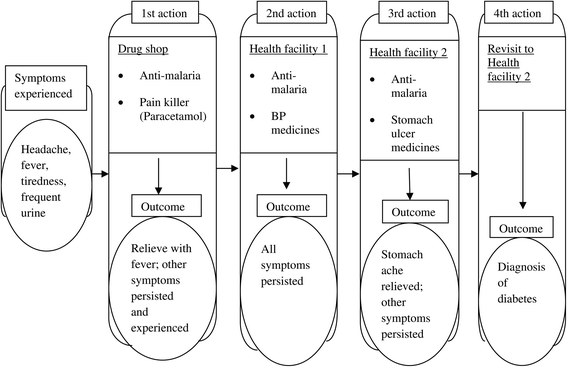"In a situation of rescuing life": meanings given to diabetes symptoms and care-seeking practices among adults in Southeastern Tanzania: a qualitative inquiry
- PMID: 25886626
- PMCID: PMC4358854
- DOI: 10.1186/s12889-015-1504-0
"In a situation of rescuing life": meanings given to diabetes symptoms and care-seeking practices among adults in Southeastern Tanzania: a qualitative inquiry
Abstract
Background: Diabetes mellitus is an emerging public health problem in Tanzania. For the community and the health system to respond adequately to this problem, it is important that we understand the meanings given to its symptoms, and the care-seeking practices of individuals.
Methods: To explore collective views on the meanings given to diabetes symptoms, we conducted nine focus group discussions with adult diabetes patients and members of the general community. To gain a better understanding of how the meanings in the community inform the care-seeking practices of individuals, 19 in-depth interviews were conducted with diabetes patients. The data were analyzed using principles of grounded theory and applying cultural schema theory as a deductive framework.
Results: In the communities and among the patients, knowledge and awareness of diabetes are limited. Both people with diabetes and community members referred to their prevailing cultural meaning systems and schemas for infectious diseases to interpret and assign meaning to the emerging symptoms. Diabetes patients reported that they had initially used anti-malarial medicines because they believed their symptoms-like headache, fever, and tiredness-were suggestive of malaria. Schemas for body image informed the meaning given to diabetes symptoms similar to those of HIV, like severe weight loss. Confusion among members of the community about the diabetes symptoms instigated tension, causing patients to be mistrusted and stigmatized. The process of meaning-giving and the diagnosis of the diabetes symptoms was challenging for both patients and health care professionals. Diabetes patients reported being initially misdiagnosed and treated for other conditions by medical professionals. The inability to assign meaning to the symptoms and determine their etiologies informed the decision made by some patients to consult traditional healers, and to associate their symptoms with witchcraft causes.
Conclusion: The meanings given to diabetes symptoms and the care-seeking practices described in the study are shaped by the prevailing cultural schemas for infectious diseases and their treatments. Efforts to educate people about the symptoms of diabetes and to encourage them to seek out appropriate care should build on the prevailing cultural meaning system and schemas for diseases, health and illness.
Figures
Similar articles
-
Role of traditional healers in the management of severe malaria among children below five years of age: the case of Kilosa and Handeni Districts, Tanzania.Malar J. 2006 Jul 18;5:58. doi: 10.1186/1475-2875-5-58. Malar J. 2006. PMID: 16848889 Free PMC article.
-
"We have become doctors for ourselves": motives for malaria self-care among adults in southeastern Tanzania.Malar J. 2014 Jul 2;13:249. doi: 10.1186/1475-2875-13-249. Malar J. 2014. PMID: 24986165 Free PMC article.
-
'He usually has what we call normal fevers': Cultural perspectives on healthy child growth in rural Southeastern Tanzania: An ethnographic enquiry.PLoS One. 2019 Sep 11;14(9):e0222231. doi: 10.1371/journal.pone.0222231. eCollection 2019. PLoS One. 2019. PMID: 31509582 Free PMC article.
-
Culture and health: the effect of Nupe cultural practice on the health of Nupe people.Niger J Med. 2006 Jul-Sep;15(3):325-8. doi: 10.4314/njm.v15i3.37241. Niger J Med. 2006. PMID: 17111771 Review.
-
Health-Seeking Behavior of People in Indonesia: A Narrative Review.J Epidemiol Glob Health. 2020 Mar;10(1):6-15. doi: 10.2991/jegh.k.200102.001. J Epidemiol Glob Health. 2020. PMID: 32175705 Free PMC article. Review.
Cited by
-
How health seeking behavior develops in patients with type 2 diabetes: a qualitative study based on health belief model in China.Front Public Health. 2024 Jul 9;12:1414903. doi: 10.3389/fpubh.2024.1414903. eCollection 2024. Front Public Health. 2024. PMID: 39045167 Free PMC article.
-
Postpartum sex taboos and child growth in Tanzania: Implications for child care.Matern Child Nutr. 2020 Oct;16(4):e13048. doi: 10.1111/mcn.13048. Epub 2020 Jul 7. Matern Child Nutr. 2020. PMID: 32633462 Free PMC article.
-
Experiences of type 2 diabetes in sub-Saharan Africa: a scoping review.Glob Health Res Policy. 2018 Sep 3;3:25. doi: 10.1186/s41256-018-0082-y. eCollection 2018. Glob Health Res Policy. 2018. PMID: 30214942 Free PMC article. Review.
-
Perception and practice of 'healthy' diet in relation to noncommunicable diseases among the urban and rural people in northern Ethiopia: a community-based qualitative study.Nagoya J Med Sci. 2018 Nov;80(4):451-464. doi: 10.18999/nagjms.80.4.451. Nagoya J Med Sci. 2018. PMID: 30587860 Free PMC article.
-
"A child may be tall but stunted." Meanings attached to childhood height in Tanzania.Matern Child Nutr. 2019 Jul;15(3):e12769. doi: 10.1111/mcn.12769. Epub 2019 Feb 6. Matern Child Nutr. 2019. PMID: 30556365 Free PMC article.
References
-
- IDF: IDF Diabetes Atlas, 6th edn., I.D. Federation, Edition 2013, International Diabetes association: Brussels, Belgium 2013. http://www.idf.org/sites/default/files/EN_6E_Atlas_Full_0.pdf. Accessed on 20th February, 2014.
-
- IDF: IDF diabetes Atlas, 5th edn., I.D. Federation, Edition 2011, International Diabetes association: Brussels, Belgium 2011 http://www.idf.org/diabetesatlas/5e. Accessed 15th October 2012.
Publication types
MeSH terms
Substances
LinkOut - more resources
Full Text Sources
Other Literature Sources
Medical


